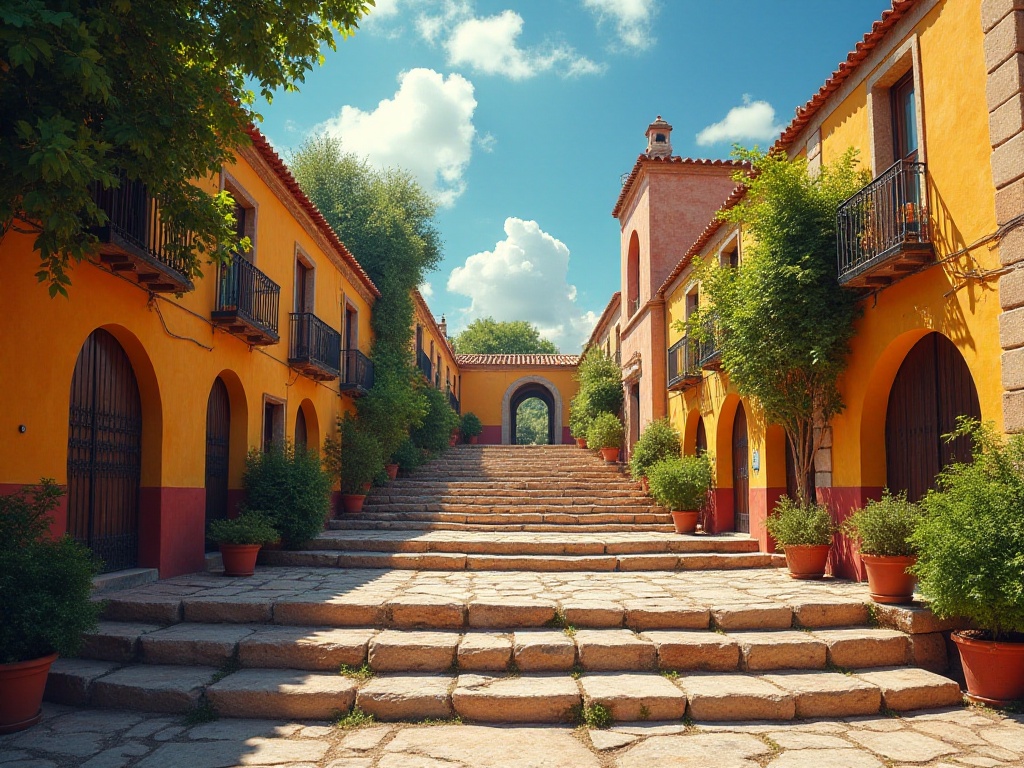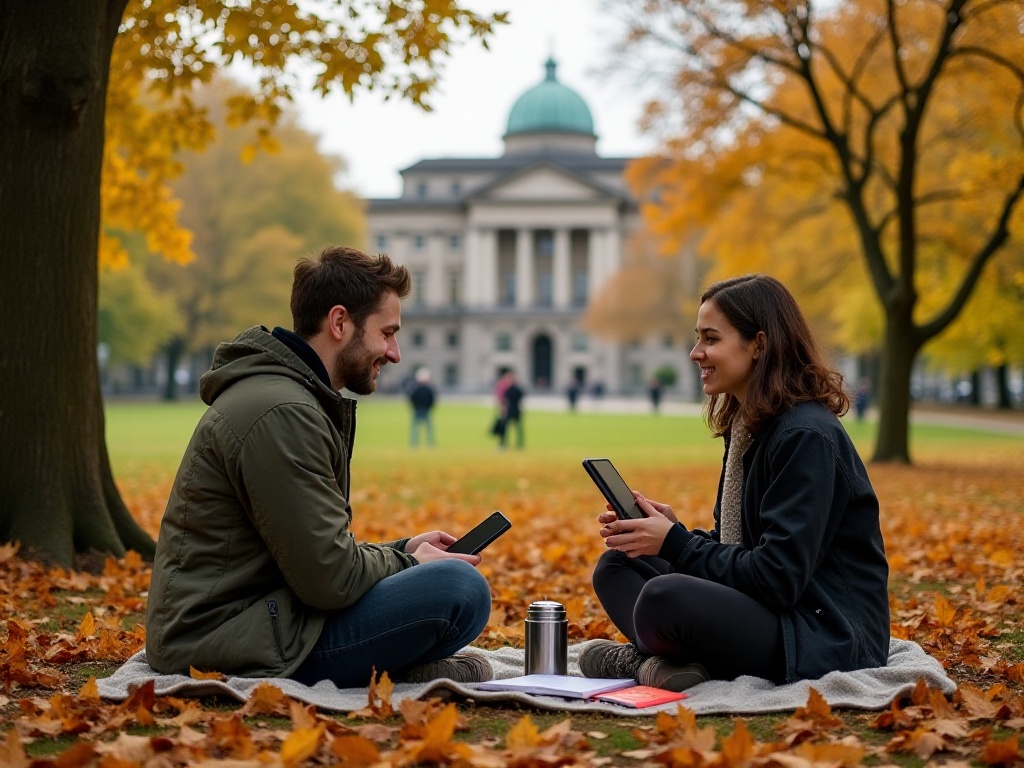
My Decision
On a winter night last year, I sat alone on the balcony of my rental apartment, staring at the city's neon lights. Looking at photos of Paris on my phone, I struggled internally with whether to make this "crazy" decision. My friends' words still echoed in my ears: "Are you crazy? What can you learn in a month? You haven't even mastered the pronunciation of 26 letters, and you want to go to Paris?"
To be honest, I wasn't completely confident either. But I clearly remembered how those conventional language learning methods in college only brought me frustration. Despite getting decent test scores from memorizing vocabulary and doing grammar exercises daily, I still stumbled when trying to speak a complete sentence in a foreign language. I secretly determined that this time I would challenge myself in a completely new way.
I began researching various travel guides, calculating budgets, and looking for accommodation. The more I learned, the more I realized this idea wasn't far-fetched. Although one month was brief, with proper preparation, it would be enough for a thorough language immersion experience.
Pre-departure Preparation
After setting my goal, I immediately began intensive preparations. First, I downloaded several highly-rated French learning apps like Duolingo and Babbel, squeezing in time to learn basic words and phrases. I also found a well-reviewed "Complete Travel French Guide" on an e-commerce platform, which exceeded my expectations in practicality, containing not only common dialogues but also specific pronunciation tips.
Besides learning materials, I also followed several bloggers living in Paris to understand local daily life habits. Through their sharing, I gained a preliminary understanding of Paris's rhythm of life and cultural characteristics. I wrote down possible scenarios in my notebook, such as ordering at cafes, buying tickets at metro stations, and shopping at markets, then prepared some common sentences accordingly.
I set myself a practical goal: not aiming to discuss literature and art fluently, but definitely being able to complete basic daily communications. For instance, asking for directions, shopping, and ordering food - these most basic scenarios I hoped to complete entirely in French. This goal seemed simple but was quite challenging for a zero-basis learner.
First Arrival in Paris
When the plane landed at Charles de Gaulle Airport, I felt both excited and nervous. Pulling my luggage out of the airport, I was faced with signs and advertisements all in French, and this unfamiliarity instantly made me realize: the real challenge was just beginning.
When choosing accommodation, I faced an important decision. I could choose to stay in the tourist-concentrated city center, where life would be convenient and many service staff would speak English. But after careful consideration, I ultimately chose the Belleville district in the Paris suburbs. This decision came from advice I saw online: if you really want to learn a language, you should try to stay away from your "comfort zone."
Belleville is a typical Parisian working-class district, where rent is much cheaper than the city center, and you can barely hear English conversations on the streets. I rented a studio apartment in a five-story building - though small, it had complete facilities, and most importantly, there was a traditional French bakery and a small supermarket downstairs.
The landlady was a French woman in her late fifties who, upon learning I was there to learn French, enthusiastically introduced me to the surrounding environment. Although I could only understand a few scattered words at the time, her gestures and expressions were enough to convey the general meaning. She even drew a simple map on paper, marking the locations of nearby supermarkets, pharmacies, and metro stations.
Language Breakthrough
Starting with Failure
I'll never forget my first experience ordering at a cafe alone. It was on the third morning in Paris, and I chose a cozy-looking small cafe. The moment I pushed open the door, my heart rate noticeably increased. I repeatedly rehearsed the prepared sentence in my mind: "Je voudrais un café au lait, s'il vous plaît." (I would like a cafe au lait, please.)
However, when the server came to me, I stuttered and couldn't complete the sentence, and my pronunciation was completely off. The server noticed my predicament and directly asked what I wanted in English. At that moment, I felt deeply frustrated, as if all my preparation had become a joke.
But it was this failed experience that strengthened my determination. I began practicing pronunciation in front of the mirror in my room, recording my French speech and listening to it repeatedly, trying to identify problems. I discovered that the biggest obstacle wasn't remembering words, but the psychological pressure of being afraid to make mistakes.

The Turning Point
By the second week, things began to change noticeably. I discovered an interesting phenomenon: as long as I actively greeted people in French, even if my pronunciation wasn't perfect, most French people would respond kindly in French. Especially at the bakery I frequently visited, the owner was a kind middle-aged lady who would deliberately slow down her speech and patiently correct my pronunciation every time I bought bread.
Once, I gathered courage to express my gratitude in broken French. She smiled and said to me: "Je peux voir que tu veux vraiment apprendre le français, et nous aimons aider les étrangers comme toi." (I can see that you really want to learn French, and we like helping foreigners like you.) These words greatly encouraged me.
I began to realize that French people weren't as cold to foreigners as rumored. On the contrary, when they see you sincerely wanting to learn their language, most people show great kindness and patience. This discovery made me more convinced that choosing to come to Paris to learn French was the right decision.

Practice Strategy
After the initial adjustment period, I gradually developed a learning method that suited me. Each day was packed full, but this sense of fulfillment made me incredibly happy.
In the morning, I would promptly go to the cafe downstairs. When ordering, I was no longer as nervous as the first time and would try to have more interaction with the servers. For example, asking about today's special desserts or asking them to recommend their favorite coffee. Even when my expression wasn't perfectly accurate, we could always reach understanding through gestures and simple words.
In the morning, I would usually walk in the nearby park. There were often local residents walking their dogs who liked to chat with passersby. I learned to compliment their dogs in simple French, which often led to pleasant conversations. Although I might only understand part of the conversation, this authentic language environment was especially helpful for improving listening comprehension.
At noon, I would go to the local outdoor market to buy ingredients. The vendors were all very enthusiastic, not only teaching me the French names of various ingredients but also telling me how to select the freshest fruits and vegetables. One particularly interesting cheese vendor would let me taste different types of cheese every time I visited his stall, while vividly describing the characteristics of each cheese. This way, I unconsciously memorized many food-related vocabulary words.
In the afternoon, I often went to the nearby library. There was a dedicated French learning section providing plenty of French textbooks and simple French reading materials. I especially liked reading illustrated children's story books, which had simple and direct language, perfect for beginners like me. After learning I was there to study French, the librarian specifically recommended some audio materials suitable for my level.
Evening was my most anticipated time because I discovered French conversation activities organized by the community cultural center. Every Wednesday and Friday evening, they held language exchange activities. Participants came from around the world, some were foreigners learning French like me, others were local French people wanting to practice English or other languages. Here, I met many like-minded friends. We would sit together, discussing various topics in simple French, from our cultural customs to impressions of Paris, the topics were endless.
Most excitingly, I met a French university student named Marie at these activities. She was learning Chinese, so we immediately hit it off and agreed to meet twice a week, spending one hour practicing French and one hour practicing Chinese. This one-on-one language exchange dramatically improved my spoken French. Marie not only patiently corrected my pronunciation and grammar mistakes but also often took me to places only locals knew about, letting me experience authentic French life.

Unexpected Gains
In the process of learning French, I gained not only improved language ability but also discovered many little-known charms of Paris.
For example, the cafe I frequently visited, though not in any tourist guide, definitely had the best croissants I'd ever eaten. The baker started working at three in the morning just to provide customers with the freshest bread. The owner told me their recipe had been passed down through three generations, with every step strictly following traditional craftsmanship. It was through conversations with the owner that I learned many professional terms about French bread.
Led by Marie, I also discovered a flea market only open to locals. This market only opened once a month, and most vendors were residents living nearby who would sell unused antiques, books, records, and other items. I found a vintage coffee grinder from the 1950s and several precious vinyl records here. Each item had a story behind it, and listening to vendors tell these stories in French was the best listening practice for me.
On weekends, I liked going to Belleville Park. Although not as famous as Luxembourg Gardens, the scenery here was equally enchanting. Standing at the highest point of the park, you could overlook the entire Paris district. More importantly, there were hardly any tourists here, just local families having picnics with their children. I would often sit on a bench, listening to children playing and chatting in French, and this immersive language environment dramatically improved my listening comprehension.

The Data Speaks
The month flew by, and when I prepared to return home, I was delighted to discover my French level had improved from zero to A2 level. To put this progress in specific data: my vocabulary increased from about 100 words to over 800, most of which were commonly used in daily life; I could conduct simple daily conversations, such as shopping in stores, asking for directions on the street, ordering in restaurants, etc., with relative fluency; most proudly, I could understand about 70% of conversations in daily scenarios.
This rate of progress was completely unimaginable when I was memorizing by rote at home. More importantly, what I learned wasn't just standard French from textbooks, but also included many practical colloquial expressions used in daily life. For instance, I learned simplified expressions French people often use in informal situations, understood what titles to use in different occasions, and mastered some authentic slang expressions.

Experience Summary
Looking back at this month of learning, I found the most crucial factor wasn't the learning method, but maintaining an open and positive attitude. Don't worry too much about whether your pronunciation is standard or if your grammar is completely correct; what's important is to actively try speaking. Real-life scenarios are the best language classroom, and every interaction is a valuable learning opportunity.
My experience proves that improving a language significantly in a short time is entirely possible with the right learning method and sufficient determination. Language learning shouldn't be limited to classrooms and textbooks but should involve going out and learning and practicing in real environments. Perhaps you can try this learning method too, and I believe you'll get unexpected surprises.
Want to know more stories about learning French in Paris? Welcome to share in the comments section. In the next article, I'll share in detail how to find suitable language exchange activities.
Next
Learning Languages in Foreign Lands: An Immersive Experience Shared by a Travel Blogger
Explore the dynamic relationship between travel and language learning, examining how immersion enhances language skills and how linguistic abilities deepen travel experiences through cultural engagement and authentic interactions
One Person's Language Journey: Measuring the World with Footsteps, Making Travel the Best Language Classroom
Explore effective methods and benefits of learning languages through travel, combining immersive strategies with practical approaches, supported by digital tools and structured resources for enhanced language acquisition and personal growth
One Person's Language Learning Journey: My 90-Day Immersion Experience in a Rural Japanese Town
Explore how travel facilitates language learning through immersive environments, covering natural and structured learning methods, along with guidance on choosing suitable language programs and courses to enhance language skills while traveling
Next

Learning Languages in Foreign Lands: An Immersive Experience Shared by a Travel Blogger
Explore the dynamic relationship between travel and language learning, examining how immersion enhances language skills and how linguistic abilities deepen travel experiences through cultural engagement and authentic interactions

One Person's Language Journey: Measuring the World with Footsteps, Making Travel the Best Language Classroom
Explore effective methods and benefits of learning languages through travel, combining immersive strategies with practical approaches, supported by digital tools and structured resources for enhanced language acquisition and personal growth

One Person's Language Learning Journey: My 90-Day Immersion Experience in a Rural Japanese Town
Explore how travel facilitates language learning through immersive environments, covering natural and structured learning methods, along with guidance on choosing suitable language programs and courses to enhance language skills while traveling



